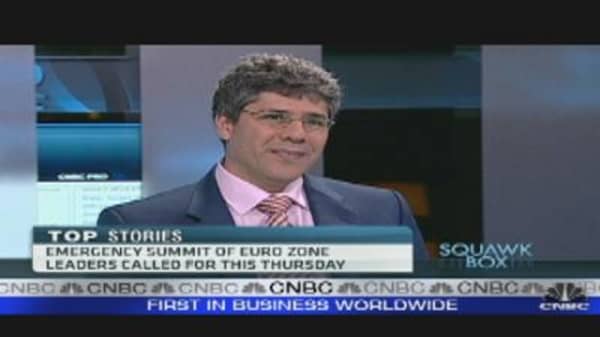The euro zone has avoided a major currency crisis so far because of the dispute around raising the debt ceiling on the other side of the Atlantic, David Bloom, global head of foreign exchange strategy at HSBC, told CNBC on Monday.
"The Europeans should be thankful that you have a debt ceiling [dispute] on the other side that has stopped a real European currency crisis," he said. "It’s a debt crisis not a currency crisis and we have the US debt to thank for that."
The euro and dollar both struck record lows against the Swiss franc in Asia on Monday as investors sought safe havens from the debt problems on both sides on the Atlantic.
Combative talks between Democrats and Republicans over the US debt ceiling have so far failed to reach a conclusion, and the August 2 deadline to resolve the issue is looming.
In Europe, fears that contagion from the economic problems in Greece and other smaller economies could hit Italy, the euro zone's third-largest economy, caused consternation in the markets last week.
"We are quite happy to sell the euro, the dollar and sterling, but we don't know what to hold instead," said Bloom. "When you sell one you have to buy another one but what if the other one is one you don't want?"
The HSBC analyst added that the debate on both sides of the Atlantic had now become more political than economic.
"Politics is the new economics," he said. "There are destabilizing events corrupting the FX market which had been very orderly."
European markets posted their biggest weekly loss in four months on Friday as the market awaited the results of key stress tests on the region's banks.
Eight banks, including two Greek banks, five Spanish and one Austrian bank, out of 90 tested, failed the European Banking Authority's (EBA) stress tests, the agency said on Friday.
"We all knew the answer already," Bloom said of the stress tests. "The problem is the next thing people say is how do these banks perform if there's a default?"
"Every time we take it to the level of stress the market says: 'But we are living through the last level of stress now. It should be even more stressful," he continued. "If contagion takes place, those are not stressful enough."
Analysts at Societe Generale agreed that the stress tests did "not reflect current reality" in a research note.
"The European banking sector is captive to politics at the moment," they wrote.
"A political error can trigger a freeze in money markets, and a liquidity crisis could quickly turn into a solvency crisis. Only improved governance would avoid such a nasty scenario."





